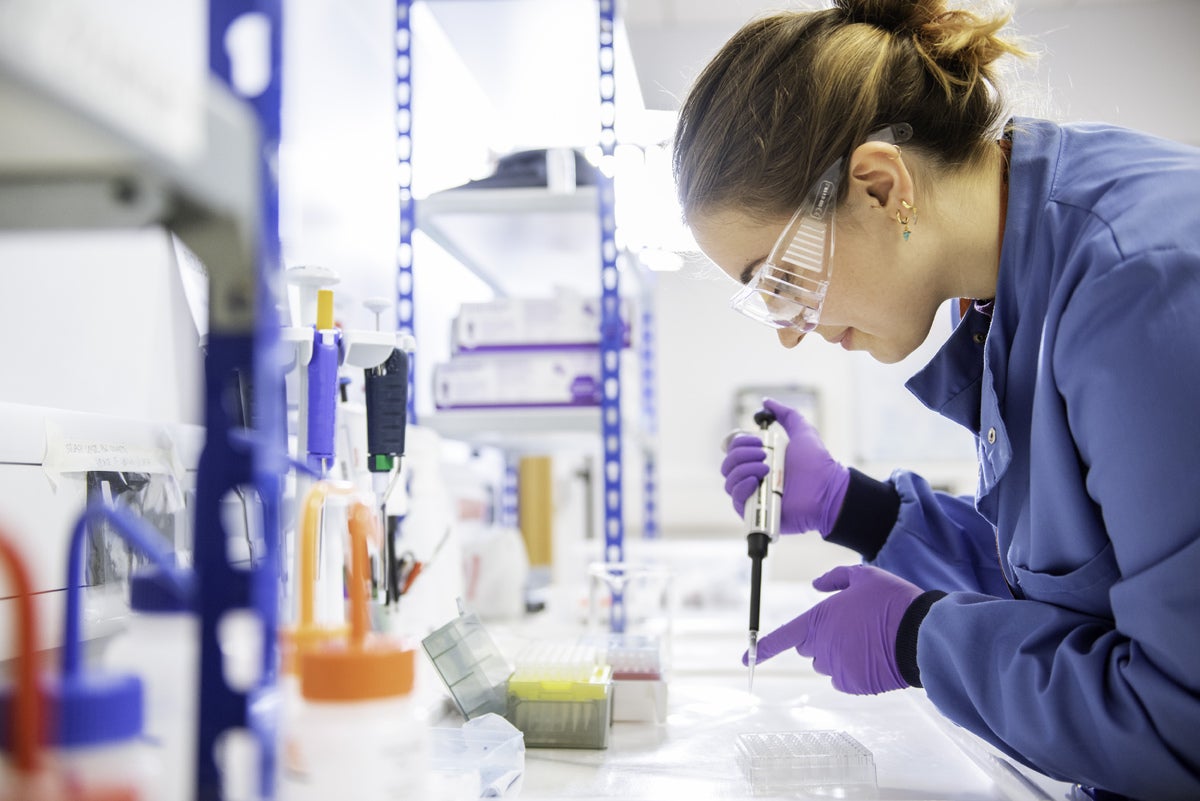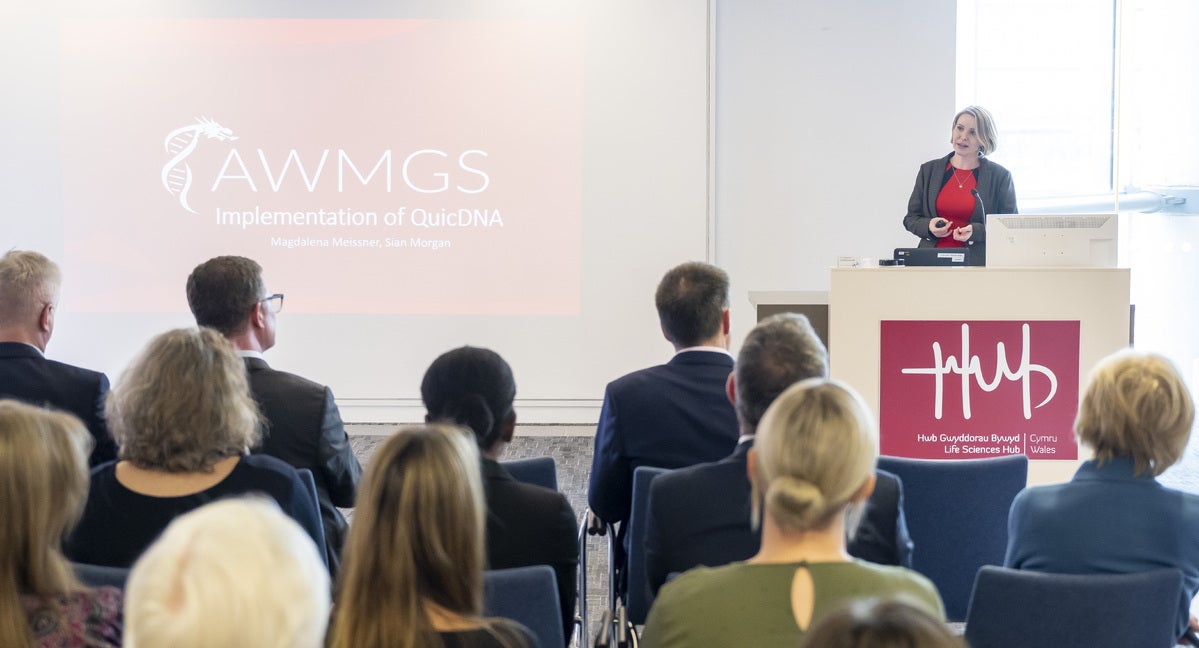Three ways we’re using innovation to improve cancer outcomes
THE ARTICLES ON THESE PAGES ARE PRODUCED BY BUSINESS REPORTER, WHICH TAKES SOLE RESPONSIBILITY FOR THE CONTENTS

Life Science Hub Wales is a Business Reporter client.
Improving cancer outcomes is a vital healthcare priority. One in two UK residents will directly experience cancer. Put simply, cancer’s impact stops people from living healthier and longer lives, alongside increasing pressures on health and social care systems.
Driving innovation to frontline services is key to addressing this challenge. Early detection, targeted treatment and improved efficiencies can save lives, enhance cancer patients’ wellbeing and support healthcare pressures.
In Wales, we’re ambitiously pursuing these goals. Government policy and organisations such as Wales Cancer Network are driving cancer diagnosis and treatment advancements like never before, while as a nation we’re fostering pioneering organisations, collaborative systems and attracting industry to facilitate healthcare transformation.
Tom Crosby, Medical Director of the Wales Cancer Network, said: “We’re proud to be facilitating change within Wales as part of our efforts to improve cancer outcomes. Our recently published Cancer Improvement Plan highlights the multifaceted approach needed to steer transformation in areas such as prevention, earlier diagnosis and treatment – with innovation adoption playing a vital role across all areas.”
Here, we explore how we’re using innovation to improve cancer outcomes.

Continuing to unlock the potential of the genome
Genomic advances play a major role in this transformation. DNA holds valuable information to help us diagnose and detect cancer quicker and less invasively, while informing treatment decisions targeted on individual genetic make-up.
In Wales, the innovative QuicDNA project is a collaboration between industry, academia, the third sector and the NHS. By evaluating non-invasive liquid biopsies as a diagnostic tool in 1,200 suspected lung cancer patients, the study aims to speed up decision making so targeted treatments can be started earlier.
Next-generation sequencing technology underpins this. It reads the genetic blueprint of a cancer cell to understand what mutations are present and enable the most effective treatments to be chosen, and is being pioneered by the All Wales Medical Genomics Service, a leading light in the UK for this clinical tool.
Advanced therapies are also revolutionising cancer care by repairing and reprogramming patients’ genes and cells. CAR-T therapy, now in use for over a decade, re-engineers a patient’s T-cells to target blood cancer cells effectively, showcasing the impact of personalised treatment.
Excitingly, the next generation of advanced therapies are emerging, standing on the shoulders of existing knowledge. CAR-M therapies re-engineer macrophages, another type of white blood cell. They can then attack and treat solid tumour cancer cells – something CAR-T therapy can’t do. Advanced Therapies Wales is an organisation that’s created an environment for clinical trials to help advanced therapies innovation progress further here.
Immunotherapies are a type of advanced therapy – where our immune system is stimulated to treat cancer. We’re proud to have a great deal of expertise in this area in Wales, including a working group where decision makers can help enact change.

Creating smart solutions through artificial intelligence
Resource limitations and operational inefficiencies often hinder patients’ progress through cancer treatment pathways. AI has emerged as a potential solution to this, expanding our cancer care approach. AI enhances clinicians’ efficiency, offering more patient-focused time. Platforms such as those created by Cardiff-based Jiva.ai streamline processes through data management workflows, aiding waiting lists and clinical trial optimisation.
AI also has the potential to revolutionise diagnostics, enabling non-invasive, swift and precise assessments such as prostate cancer. Here, this technology can complement the vital work clinical staff do. Welsh firm CanSense, for example, employs AI-driven models for early bowel cancer detection, using a simple blood test.
Cultivating innovation through collaboration
Any innovator who wants to transform cancer outcomes cannot go it alone, and the right collaboration is stronger than the sum of its parts.
Wales Cancer Industry Forum (WCIF) provides a multidisciplinary network to encourage cross-sector collaboration between over 100 senior leaders. It acts as a vital interface for clinicians to engage with multinational to SME-sized organisations spanning pharma, medtech and digital. This is helping to drive a cancer innovation programme in Wales.
Richard Erwin, Chair of WCIF and General Manager at Roche Products, said: “Wales is a fantastic location for industry partners who want to collaborate with our NHS and use their innovation to help improve cancer outcomes. We’ve got the ambition to make Wales the place of choice for cancer trials – our relatively small size and joined-up healthcare system can help realise this exciting potential.”
Helping get the right people to the table to kickstart collaboration is a big part of our work at Life Sciences Hub Wales, ultimately driving vital innovation to the frontline of health and social care. Alongside partnership development, we also offer services including funding support, innovation guidance, horizon scanning and project management.
We share the ambitions of our partners across health, social care and industry to improve cancer outcomes through innovation. We’re here to help make it happen.
Get in contact to see how we can support you, right up to – and including – end-user adoption.

Cari-Anne Quinn is Chief Executive Officer at Life Sciences Hub Wales, leading our team in propelling vital life science innovation to the frontline of health and social care. Her guidance aims to cultivate a thriving and healthy Wales through these advancements.
With a wealth of expertise, Cari-Anne has been instrumental in instigating transformation though economic development on an international scale through her work at the Welsh Development Agency. Additionally, she led the Welsh Government’s involvement in business engagement for the life sciences sector with the economy department, where her contribution has played a crucial role in nurturing significant life sciences projects such as Medicentre.
